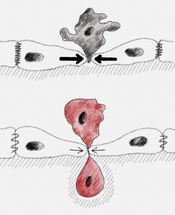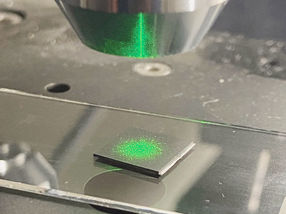New class of drug targets heart disease
Researchers at the University of Alberta have developed a synthetic peptide that could be the first in a new class of drugs to treat heart disease, high blood pressure and diabetes.
Researchers at the U of A found that a deficiency in the peptide apelin is associated with heart failure, pulmonary hypertension and diabetes. They also developed a synthetic version that targets pathways in the heart and promotes blood vessel growth.
Lead author Gavin Oudit, an associate professor in the Faculty of Medicine & Dentistry, said the synthetic form of apelin is far more stable and potent than the naturally occurring peptide, making drug therapies possible.
"It's a new group of drugs that we hope can be used for a wide variety of disorders, all of which have a huge economic burden on the health-care system," said Oudit, a cardiologist and clinician-scientist at the Mazankowski Alberta Heart Institute.
Oudit's research group studied apelin deficiency in the hearts of mice and humans through the Human Explanted Heart Program, or HELP. The HELP program allows for the study of specimens obtained from patients undergoing a heart transplant.
The research team found that hearts from patients who suffered heart attacks were deficient in apelin, which is needed for angiogenesis—the formation of new blood vessels that helps the body adapt after tissue damage from heart attacks.
Oudit's team has filed a provisional patent on the synthetic apelin and will continue work developing the drug to be more potent and clinically applicable. Once the drug is perfected, they'll move into the first phase of clinical trials in two to three years.
Oudit said the breakthrough could not have happened without the contributions of U of A colleagues, including John Vederas, a medicinal chemist and professor in the Department of Chemistry, and Allan Murray, a clinician-scientist and nephrologist in the Department of Medicine. Wang Wang and Shaun McKinnie, both PhD students in Oudit's and Vederas's laboratories, also played a key role in this discovery.
"Having this kind of environment that's multidisciplinary and collaborative is absolutely critical to take a discovery to the next level," Oudit said. "We showed this kind of translational work can be done here, in Edmonton, at the University of Alberta."
Most read news
Topics
Organizations
Other news from the department science

Get the life science industry in your inbox
By submitting this form you agree that LUMITOS AG will send you the newsletter(s) selected above by email. Your data will not be passed on to third parties. Your data will be stored and processed in accordance with our data protection regulations. LUMITOS may contact you by email for the purpose of advertising or market and opinion surveys. You can revoke your consent at any time without giving reasons to LUMITOS AG, Ernst-Augustin-Str. 2, 12489 Berlin, Germany or by e-mail at revoke@lumitos.com with effect for the future. In addition, each email contains a link to unsubscribe from the corresponding newsletter.





















































